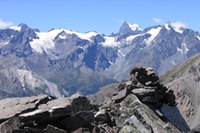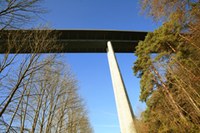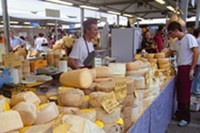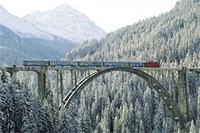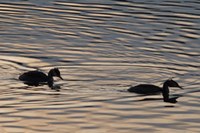Articles
2018 Olympics - How green are France's candidatures?
Four French towns are bidding to stage the 2018 Winter Olympics: Read More…
Switzerland says No to "gigaliners"
Environmental associations have launched a campaign against the introduction of "gigaliners" on Switzerland's roads. The country's Bundesrat [Federal Council] has already clearly rejected the "monster trucks". Read More…
Even high-elevation Himalayan glaciers are melting
Glacier studies by an international team led by Natalie Kehrwald of Ohio State University show that even high-elevation glaciers are suffering from the effect of climate change. Read More…
Lots of Russian tourists in Austria
Never before have so many Russian holidaymakers come to Austria as in 2008. Hotels reported a 35% rise in arrivals and a 40% increase in overnight stays. Read More…
Discussion on territorial cohesion in Europe
Discussion of the European Commission's Green Paper on Territorial Cohesion entitled "Territorial Diversion as Strength" has been underway since October 2008. Read More…
LexALP online database
The LexALP project (Legal Language Harmonisation System for Environment and Spatial Planning within the Multilingual Alps) co-financed by the EU is aimed at collating and explaining specialised terminology relating to the subjects of spatial planning and sustainable development, and making available free of charge on an internet website. Read More…
More than 10,000 alien species in Europe
The fact that more and more non-indigenous species of fauna and flora are spreading throughout Europe is nothing new. But for the first time a complete list of all the invasive species has now been compiled. Read More…
Alpine Crossing
The "Alpine Pearls" co-operation venture is organising a "softly mobile" winter trip through the Pearls of the Alps between 19 and 30 January 2009 - specially for members of the press. Read More…
ACCESS: Improving the provision of basic services
ACCESS, the transnational project, was launched in Genoa/I at the end of October. Its objective is to improve the provision of basic public services in rural mountain regions using innovations in organisation. Read More…
Projects on transnational networking in the area of natural hazards
AdaptAlp, a recently launched EU project, looks at climate response measures and the evaluation of natural hazards. The work on strategies and proposed solutions aimed at coping with the impact of climate change is to provide the basis for more intensive international co-operation in natural hazard management. Read More…
A scientific insight into mountain regions and cultures worldwide
In the October issue of its IHDP Update magazine the International Human Dimensions Programme on Global Environmental Change (IHDP) looks at mountain regions worldwide. Read More…
Is climate change drying up the Alps?
The Alpine range will continue to fulfil its role as central Europe's water tower in the future. But not without restrictions, according to the forecasts of a current study by a group of 20 experts commissioned by the European Environment Agency (EEA). Read More…
